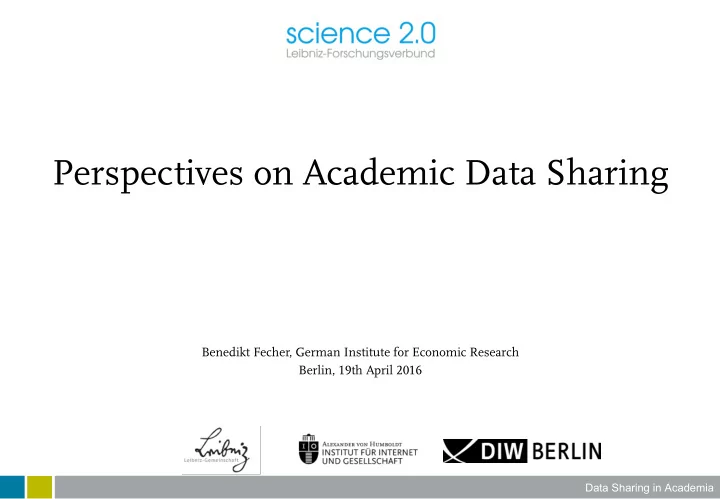

Perspectives on Academic Data Sharing Benedikt Fecher, German Institute for Economic Research Berlin, 19th April 2016 8,65 Data Sharing in Academia
Agenda 1. The potential of data sharing 2. An ideal professed but not practiced * 1. Researchers 2. Funders 3. Journals 3. An integrated approach 8,65 Data Sharing in Academia
The great potential of data sharing Erroneous analyses can inform political decisions. 8,65 Data Sharing in Academia
The great potential of data sharing 8,65 Data Sharing in Academia
The great potential of data sharing »Economists treat replication the way teenagers treat chastity— as an ideal to be professed but not to be practiced« Hamermesh, 2007 8,65 Data Sharing in Academia
The great potential of data sharing »60% to 90% of respondents in all disciplines agree with the statement that they would use other researchers' datasets if their datasets were easily accessible.« Tenopir et al., 2011 8,65 Data Sharing in Academia
The great potential of data sharing »The current situation can [...] be characterized as too few cases for too many factors. The size of sample sets even large institutions can collect is too small for evidence-based and highly stratified medicine.« Floca, 2014 8,65
The great potential of data sharing Open Data in Research: A Catalyst for Scientific Progress? § Increases replicability § Creates synergies § Allows (new) methods 8,65 Data Sharing in Academia
An ideal professed but not practiced »The 'dirty little secret' behind the promotion of data sharing is that not much sharing may be taking place.« Borgman 2012: 1059 8,65 Data Sharing in Academia
An ideal professed but not practiced § Researchers § Funding policies § Journal policies 8,65 Data Sharing in Academia
An ideal professed but not practiced Researchers § 83% say that open research data is a major contribution to scientific progress; 13% have shared publicly in the past § „If others can publish before me“ is by far the biggest impediment (4.25) § „Criticism or Falsification“ the least important impediment (1.99) § 61 % of the natural scientists say they know how and where to archive data; 42 % of social scientists and economics Source: Own survey among 1564 German researchers 8,65 Data Sharing in Academia
Data Sharing in Academia Study Have shared data publicly in the past Humanities 19% Natural Science 17% Agricultural Science 14% Engineering 12% Social Sciences & Economics 9% Medicine 8% Source: Own survey among 1564 German researchers 8,65 Data Sharing in Academia
An ideal professed but not practiced Funding Guidelines § from 36, 23 (66%) mention data management § Documentation: 18 (51%) mention standards § 12 (34%) mandatory disclosure, 11 (31%) recommend, 12 (34%) no policy § 14 (40%) mention embargo periods Source: Own analysis of 36 funding guidelines 8,65 Data Sharing in Academia
An ideal professed but not practiced Journals § 346 journals in economics and business studies § 49 (14%) have a data availability policy § 37 (11%) require data and supporting material § From the 126,500 studies published in the top 50 economics journals (1974-2014), 131 were replication studies § more than half of the top-50-journals have never published a Source: replication study Vlaeminck & Herrmann, 2015 Mueller-Langer et al, 2015 8,65 Data Sharing in Academia
An integrated approach § Create Incentives § Reduce uncertainties § Reduce effort § Facilitate Reuse 8,65 Data Sharing in Academia
An integrated approach Data Donor 122 (24/98) Norms Data infrastructure Data provider Data § Non-academic Research org. recipient Research community Data recipients Academic recipient Source: Own systematic review Data flow ¡ 8,65 Data Sharing in Academia
An integrated approach Create Incentives Data Donor 122 (24/98) Norms Data infrastructure Data provider Data § Non-academic Research org. recipient Research community Data recipients Academic recipient Data flow ¡ 8,65 Data Sharing in Academia
An integrated approach Data Donor 122 (24/98) Norms Data infrastructure Data provider Reduce uncertainties Data § Non-academic Research org. recipient Research community Data recipients Academic recipient Data flow ¡ 8,65 Data Sharing in Academia
An integrated approach Data Donor 122 (24/98) Norms Data infrastructure Data provider Reduce effort Data § Non-academic Research org. recipient Research community Data recipients Academic recipient Data flow ¡ 8,65 Data Sharing in Academia
An integrated approach Data Donor 122 (24/98) Norms Data infrastructure Data provider Data § Non-academic Research org. recipient Research community Data recipients Academic Facilitate reuse recipient Data flow ¡ 8,65 Data Sharing in Academia
Fecher B, Fräßdorf M, Fecher B, Friesike S, Wagner GG. Perceptions Hebing M, Linek S, and Practices of Sauermann A (2015) A Replicatiion by Social and Reputation Economy: Behavioral Scientists: Results from an Empirical Making Replication a Survey on Academic Data Mandatory Element of Sharing. DIW Berlin Curricula Would be Useful. Discussion DIW Discussion Papers. 2016; ¡ Fecher B, Friesike S, Hebing M (2015) What Drives Academic Data Sharing? PLoS ONE 10(2): e0118053. 8,65 Data Sharing in Academia
References § Cassidy, John (2013) The Reinhart and Rogoff Controversy: A Summing Up. http://www.newyorker.com/news/john-cassidy/the- reinhart-and-rogoff-controversy-a-summing-up. § Fecher, Benedikt, Sascha Friesike, and Marcel Hebing (2015) What Drives Academic Data Sharing? Robert S. Phillips, ed. PLOS ONE 10(2): e0118053. § Fecher, Benedikt, Sascha Friesike, Marcel Hebing, Stephanie Linek, and Armin Sauermann 2015 A Reputation Economy: Results from an Empirical Survey on Academic Data Sharing. DIW Berlin Discussion Paper 1454. http://dx.doi.org/10.2139/ssrn.2568693. § Hamermesh, Daniel (2012) Six Decades of Top Economics Publishing: Who and How? w18635. Cambridge, MA: National Bureau of Economic Research. http://www.nber.org/papers/w18635.pdf, accessed April 12, 2015. § Ian, Sample (2015) Study Delivers Bleak Verdict on Validity of Psychology Experiment Results. http://www.theguardian.com/ science/2015/aug/27/study-delivers-bleak-verdict-on-validity-of-psychology-experiment-results. § Tenopir, Carol, Suzie Allard, Kimberly Douglass, et al. (2011) Data Sharing by Scientists: Practices and Perceptions. Cameron Neylon, ed. PLoS ONE 6(6): e21101. § The Economist (2013) Problems with Scientific Research: How Science Goes Wrong. http://www.economist.com/news/leaders/ 21588069-scientific-research-has-changed-world-now-it-needs-change-itself-how-science-goes-wrong. 8,65 Data Sharing in Academia
Recommend
More recommend